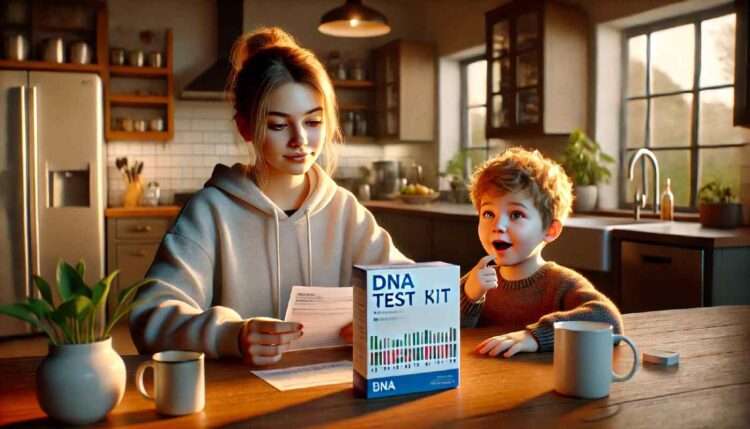Imagine discovering a long-lost brother or sister you never knew existed. Or perhaps you’ve always wondered if you and your sibling share both parents. A simple sibling DNA test can provide answers to these questions, but it’s essential to understand the process, the ethical considerations, and where to get tested.
What Is Sibling DNA Testing?
A Sibling DNA test determines the likelihood that two individuals share one or both biological parents. Unlike paternity tests, which directly compare a child’s DNA to a potential father’s, sibling tests analyze the genetic material of both individuals to assess their relationship. The results can indicate whether individuals are full siblings (sharing both parents), half-siblings (sharing one parent), or not biologically related.
Why Consider a Sibling DNA Test?
There are various reasons someone might pursue sibling DNA test:
- Curiosity About Family Connections: Some individuals seek to confirm biological relationships due to family stories or personal curiosity.
- Medical History: Knowing your biological relatives can provide insights into potential genetic health risks.
- Legal Matters: Establishing sibling relationships can be crucial in inheritance disputes or immigration cases.
The Testing Process
The procedure for sibling DNA testing is straightforward:
- Sample Collection: A common method involves using a cheek swab to collect cells from the inside of the mouth. This is painless and can often be done at home or in a clinic.
- Laboratory Analysis: The samples are sent to a laboratory, where scientists examine specific DNA markers to determine genetic similarities.
- Results: The laboratory provides a report indicating the probability of a sibling relationship. It’s important to note that, unlike paternity tests, sibling DNA tests often provide a probability rather than a definitive answer.
Ethical Considerations
While sibling DNA testing can offer valuable insights, it’s essential to consider the ethical implications:
- Privacy Concerns: Testing can reveal sensitive information, such as undisclosed adoptions or instances of infidelity. It’s crucial to prepare for potential unexpected outcomes.
- Consent: All parties involved should provide informed consent before undergoing testing. Testing someone’s DNA without their permission is unethical and, in some places, illegal. For instance, in the UK, acquiring someone’s DNA without consent is a criminal offense.
- Emotional Impact: Discovering unexpected information about one’s family can lead to emotional distress. It’s advisable to seek counseling or support when navigating these revelations.
Where to Get Tested
If you’re considering a sibling DNA test, several options are available:
- Accredited Laboratories: Many companies offer DNA testing services. It’s essential to choose a laboratory accredited by recognized organizations to ensure accuracy and reliability. For example, DNA Worldwide offers sibling DNA tests analyzing up to 68 genetic locations, providing detailed results.
- Home Testing Kits: Some companies provide kits that allow you to collect samples at home and send them to a lab for analysis. While convenient, it’s crucial to ensure the company is reputable and the test is accurate.
- Medical Facilities: Some hospitals and clinics offer DNA testing services. Consulting with a healthcare professional can provide additional guidance and support.
If you’re considering a sibling DNA test to determine biological relationships, it’s crucial to choose a reputable service. Here are five top companies offering sibling DNA testing:
- AncestryDNA: AncestryDNA is renowned for its extensive database, which enhances the likelihood of identifying biological relationships. Their autosomal DNA test provides insights into familial connections and ethnic backgrounds. While they don’t offer a specific sibling test, their comprehensive DNA packages can help determine sibling relationships.
- 23andMe: 23andMe offers a detailed autosomal DNA test that can identify potential sibling relationships. In addition to ancestry information, they provide health-related genetic insights. Their user-friendly platform allows for easy comparison of DNA segments between potential siblings.
- MyHeritage DNA: MyHeritage provides a comprehensive DNA testing service with a focus on ancestry and family connections. Their platform includes tools for matching with potential relatives, which can be instrumental in identifying sibling relationships.
- FamilyTreeDNA: FamilyTreeDNA offers a range of DNA testing services, including autosomal, Y-DNA, and mitochondrial DNA tests. Their Family Finder test is designed to identify relationships up to the fifth cousin level, making it suitable for detecting sibling connections.
- EasyDNA: EasyDNA provides sibling DNA tests with results ready in 5-7 working days. Samples are collected using oral swabs, and the inclusion of the biological mother’s DNA sample is recommended for more accurate results. They also offer additional testing options depending on the gender of the individuals involved.
When selecting a service, consider factors such as accreditation, result turnaround time, and whether the results need to be legally admissible. Always ensure that the company follows ethical guidelines and that all parties involved provide informed consent.
Legal Implications
In certain situations, sibling DNA test results may be used in legal contexts, such as inheritance claims or immigration cases. For results to be admissible in court, the testing process must follow strict chain-of-custody procedures. If you anticipate needing the results for legal purposes, inform the testing facility beforehand to ensure proper protocols are followed.
Conclusion
Sibling DNA testing can unlock answers about your biological relationships, offering clarity and peace of mind. However, it’s essential to approach the process thoughtfully, considering the ethical, emotional, and legal aspects involved. By choosing a reputable testing service and preparing for potential outcomes, you can navigate the journey of discovery with confidence.




